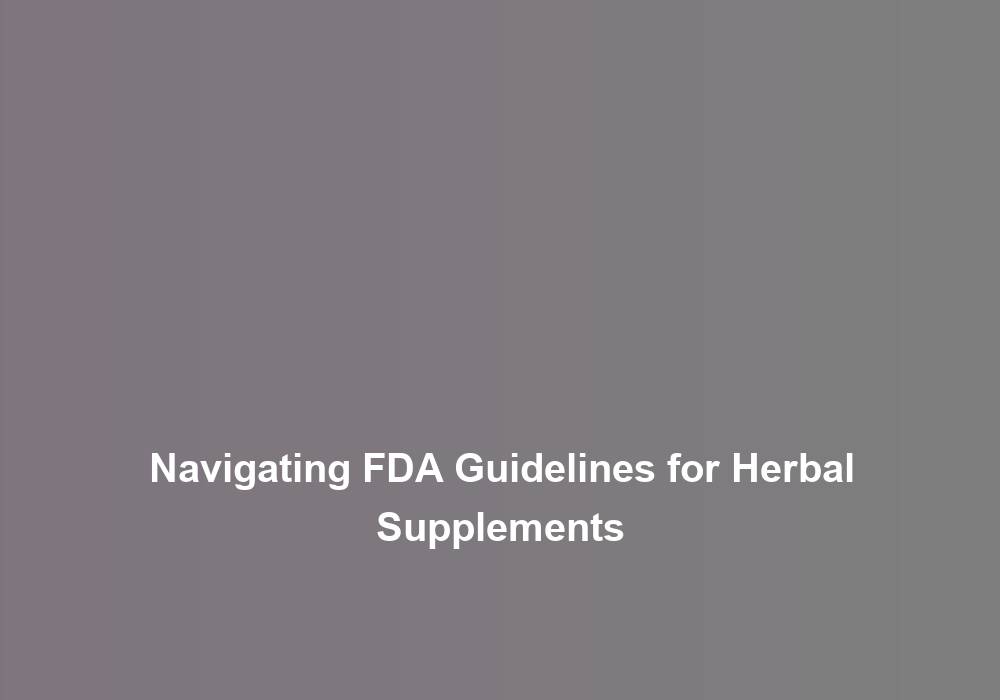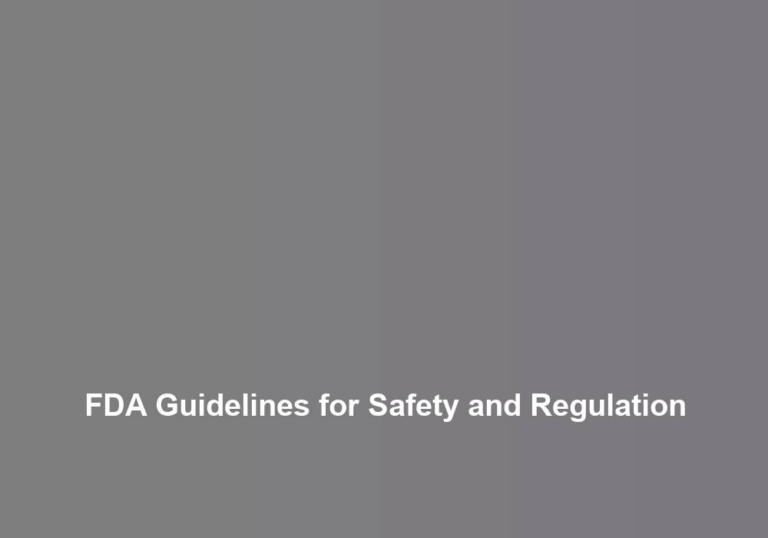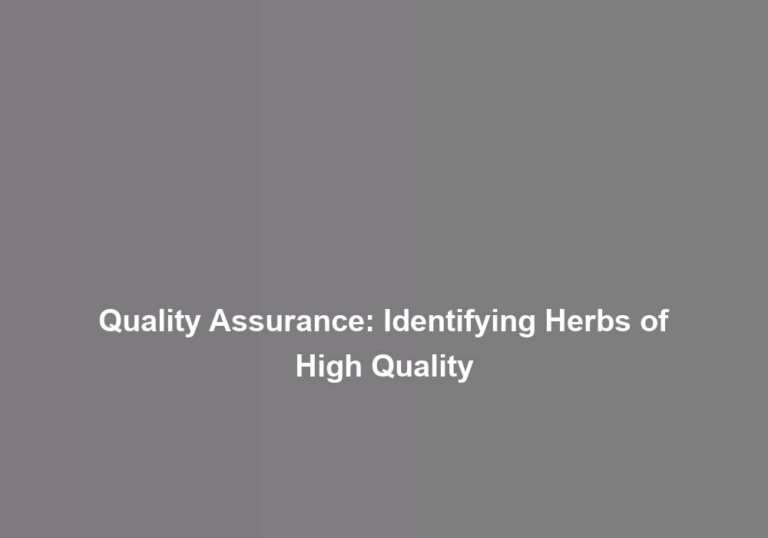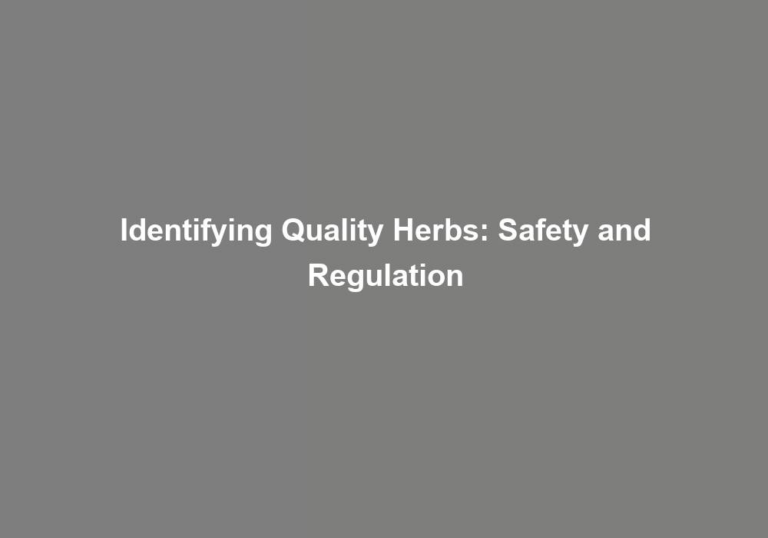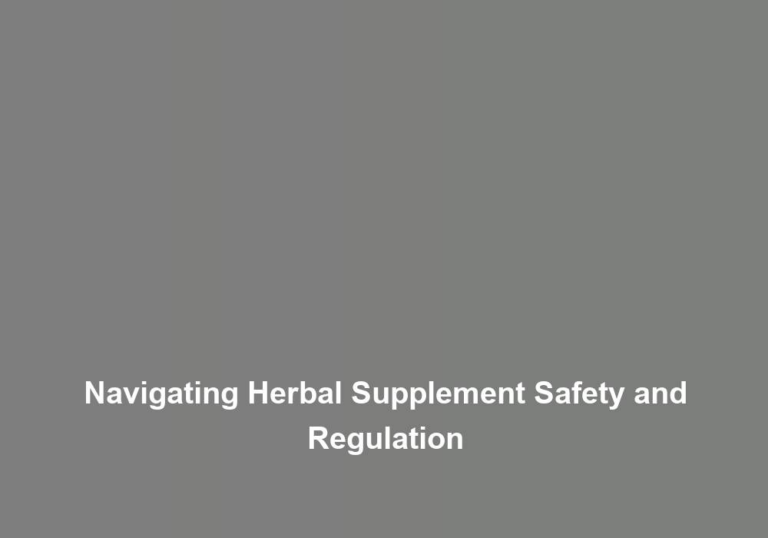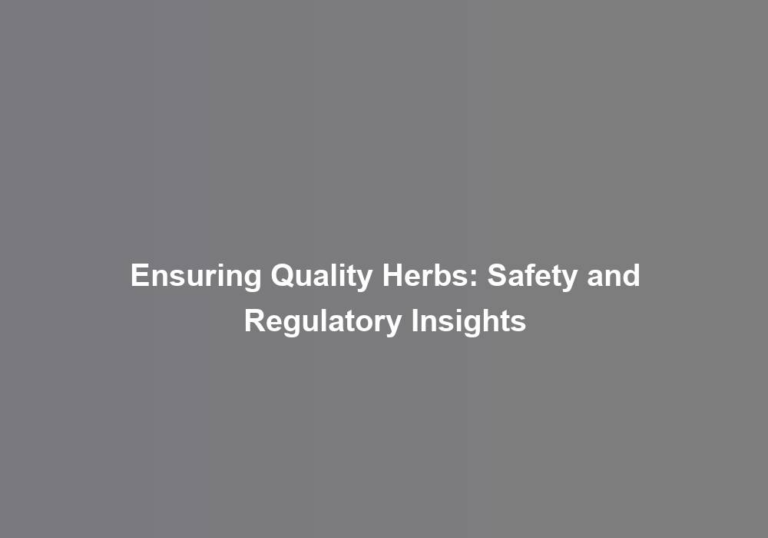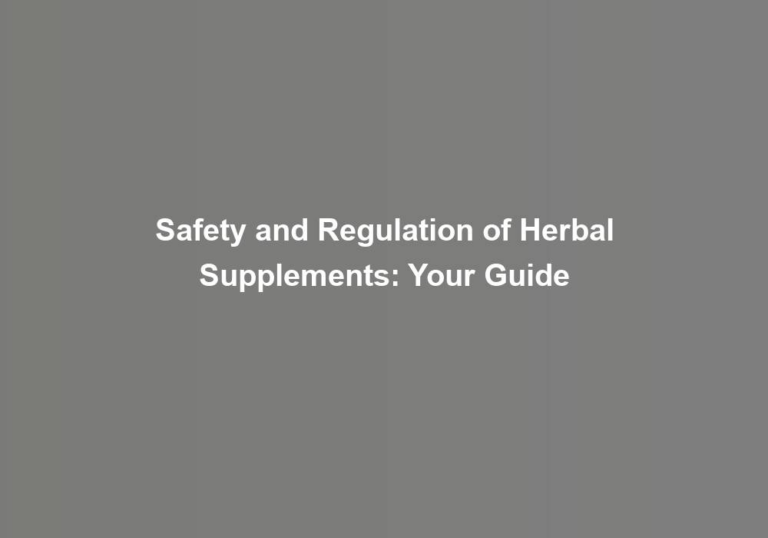Navigating FDA Guidelines for Herbal Supplements
Navigating the FDA guidelines for herbal supplements is like charting a course through a vast and ever-changing sea. With the regulatory landscape constantly evolving, it can be a challenging journey to ensure compliance and safety for your products. But fear not, as weG??ll guide you through the key aspects of FDA regulations for herbal supplements, from understanding the requirements to navigating the intricate process of New Dietary Ingredient (NDI) notification. So, letG??s set sail and explore the crucial steps to ensure your herbal supplements meet FDA guidelines and reach their intended destination in the market.
Understanding FDA Regulations
To understand FDA regulations for herbal supplements, itG??s important to carefully review the guidelines provided by the agency. When it comes to herbal remedies, the FDA does not strictly regulate them in the same way it does prescription and over-the-counter drugs. Herbal supplements are generally considered as food products, so they fall under a category of their own. This means that they do not require FDA approval before they are marketed to the public. However, this doesnG??t mean that herbal supplements are completely unregulated. The FDA can take action against any herbal supplement that is found to be unsafe or mislabeled. This is why itG??s crucial to choose herbal supplements from reputable manufacturers who follow good manufacturing practices and ensure the quality and safety of their products.
When it comes to FDA approval, itG??s important to understand that while the FDA does not approve herbal supplements before they are sold, they still have the authority to regulate these products after they have entered the market. This includes taking action against any supplements that are found to be adulterated or misbranded. ItG??s also essential to note that the FDA may inspect supplement facilities to ensure compliance with regulations.
Labeling Requirements for Herbal Supplements
As you consider purchasing herbal supplements, itG??s crucial to understand the labeling requirements enforced by the FDA to ensure the safety and accuracy of product information. Product labeling for herbal supplements must comply with stringent FDA regulations to provide consumers with clear and truthful information about the product. HereG??s an overview of the essential labeling requirements for herbal supplements:
| Labeling Requirement | Description |
|---|---|
| Identity of the Product | The label must accurately identify the herbal supplement, including the name of the product. |
| Net Quantity of Contents | The quantity of the supplement in the package must be clearly stated in terms of weight or volume. |
| Nutrition Labeling | If the herbal supplement includes a nutrition label, it should comply with FDA nutrition labeling regulations. |
Understanding these requirements is important for both manufacturers and consumers. For manufacturers, compliance with FDA labeling requirements ensures that their products meet the necessary standards for safety and accuracy. For consumers, clear and truthful product labeling provides the information needed to make informed decisions about the herbal supplements they purchase. By adhering to these labeling requirements, manufacturers contribute to the overall safety and quality of herbal supplements in the market, and consumers can have greater confidence in the products they choose.
Good Manufacturing Practices (GMP) Compliance
Understanding and adhering to good manufacturing practices (GMP) compliance is essential for ensuring the safety and quality of herbal supplements. GMP compliance standards are put in place by the FDA to ensure that herbal supplements are manufactured, packaged, labeled, and held to a high standard. When it comes to GMP compliance, itG??s important for manufacturers to implement thorough quality control systems, proper documentation, and rigorous testing procedures. This ensures that the herbal supplements meet the necessary specifications for identity, purity, strength, and composition.
GMP inspections are conducted by the FDA to assess a manufacturerG??s compliance with these standards. During these inspections, the FDA evaluates the manufacturing facilities, equipment, personnel, and processes involved in the production of herbal supplements. By adhering to GMP compliance, manufacturers can demonstrate their commitment to producing safe and high-quality herbal supplements. This not only helps in gaining the trust of consumers but also ensures that the products meet regulatory requirements.
Compliance with GMP standards is crucial for maintaining the integrity of herbal supplements and safeguarding public health. By following these guidelines, manufacturers can mitigate the risks of contamination, adulteration, and improper labeling. Furthermore, adhering to GMP compliance can also lead to improved efficiency and consistency in the manufacturing process, ultimately benefiting both the manufacturer and the consumers.
Safety and Risk Assessment for Herbal Ingredients
Now, letG??s talk about the safety and risk assessment for herbal ingredients. YouG??ll explore how ingredient safety assessment and risk evaluation processes are crucial in ensuring the quality of herbal supplements. Additionally, understanding herbal ingredient toxicity is essential for assessing potential risks associated with these products.
Ingredient Safety Assessment
Ensure the safety and risk assessment of herbal ingredients by conducting thorough evaluations and analyses. Safety evaluation involves rigorous toxicology studies to determine the potential risks associated with herbal ingredients. Toxicology studies assess the adverse effects of herbal components on human health and help in establishing safe dosage levels. It is crucial to consider the chemical composition, potential contaminants, and any known side effects when conducting safety assessments. Additionally, evaluating the historical use of the herbal ingredient in traditional medicine and its pharmacological properties is essential for a comprehensive safety assessment. By prioritizing safety evaluations, you can confidently offer herbal supplements that meet the highest standards of quality and consumer protection. Always prioritize the safety and well-being of your consumers by ensuring stringent safety assessments for herbal ingredients.
Risk Evaluation Process
To proceed with the risk evaluation process for herbal ingredients, thoroughly analyze the potential adverse effects and toxicology studies conducted in the safety assessment. When evaluating the risk assessment for herbal supplements, consider the following:
-
Hazard Identification: Identify and characterize potential hazards associated with the herbal ingredients.
-
Exposure Assessment: Determine the level, duration, and frequency of human exposure to the herbal supplement.
-
Risk Characterization: Integrate hazard identification and exposure assessment to estimate the risk of adverse effects.
-
Uncertainty Analysis: Address any uncertainties in the data and methodologies used for risk assessment to provide a more accurate evaluation.
Herbal Ingredient Toxicity
When evaluating the safety and risk of herbal ingredients, it is crucial to thoroughly assess their potential toxicity through comprehensive toxicology studies and hazard identification. Herbal ingredient interactions and toxicity testing are vital components of this assessment. Toxicity testing involves examining the potential adverse effects of herbal ingredients on the body, and it helps in determining safe dosage levels. Additionally, understanding the interactions between different herbal ingredients is essential to ensure that they do not produce harmful effects when combined. This process allows for the identification of any potential risks associated with specific herbal ingredients and helps in making informed decisions regarding their safety for consumption. By conducting thorough toxicity testing and considering herbal ingredient interactions, the safety and risk assessment for herbal supplements can provide consumers with the confidence that they are using products that have been rigorously evaluated for their safety.
Claims and Advertising Guidelines
Advertising of herbal supplements must adhere to the FDA guidelines regarding claims to ensure accuracy and transparency. The FDA has strict standards in place to govern the advertising of herbal supplements, and itG??s essential to understand these guidelines to avoid potential legal issues and to maintain consumer trust. Here are some key points to consider:
-
Advertising Standards: The FDA requires that all advertising for herbal supplements is truthful and not misleading. This means that any claims made about the benefits of the supplements must be substantiated by scientific evidence. ItG??s vital to ensure that the language used in advertising is clear and does not give a false impression of the productG??s efficacy.
-
Claim Substantiation: Any claims about the health benefits or efficacy of herbal supplements must be supported by reliable scientific evidence. This evidence should be based on well-controlled human clinical studies or other appropriate research. ItG??s crucial to thoroughly review and understand the scientific evidence supporting any claims before using them in advertising materials.
-
Transparency: The FDA guidelines emphasize the importance of transparency in advertising herbal supplements. This includes disclosing any potential risks or side effects associated with the product and providing clear information about the supplementG??s ingredients and their concentrations.
-
Compliance: Adhering to the FDA guidelines is not just a matter of ethical responsibility but also legal compliance. Failure to comply with these guidelines can result in serious consequences, including product seizure, injunctions, and civil or criminal penalties.
Navigating the New Dietary Ingredient (NDI) Notification Process
Navigating the New Dietary Ingredient (NDI) Notification Process requires a clear understanding of the FDAG??s requirements and procedures for submitting notifications. When introducing a new dietary ingredient to the market, itG??s essential to ensure regulatory compliance by following the NDI notification process. This process helps the FDA evaluate the safety and legality of the ingredient before it is marketed to consumers. Below is a simple guide to help you navigate the NDI notification process:
| NDI Notification Process | Description |
|---|---|
| Determine if NDI applies | Assess if your ingredient qualifies as an NDI |
| Preparing the notification | Gather and organize all required information |
| Submitting the notification | Send the notification to the FDA for review |
| FDA evaluation | Wait for the FDA to evaluate the submitted data |
Understanding and following these steps is crucial to ensure that your new dietary ingredient complies with FDA regulations. By navigating the NDI notification process diligently, you not only demonstrate your commitment to regulatory compliance but also contribute to the safety and transparency of the dietary supplement industry. Remember, the NDI notification process is in place to protect consumers and promote the responsible introduction of new dietary ingredients.
Conclusion
Now that you understand the FDA guidelines for herbal supplements, you can confidently navigate the process. Did you know that over 23,000 emergency room visits per year are related to dietary supplements? By following the regulations, you can help ensure the safety and quality of herbal supplements for consumers.

